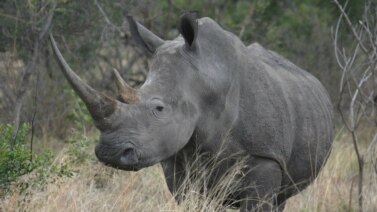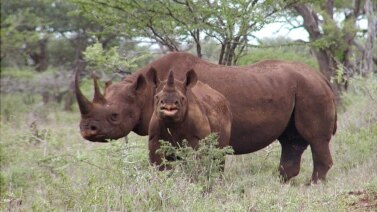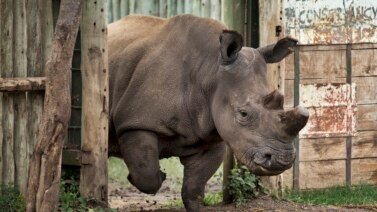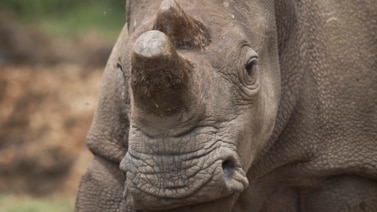
From VOA Learning English, this is the Agriculture Report in Special English.
Some private game farmers in South Africa are hiring armed protection for their rhinos. New security companies are being started to fight an increase in rhinoceros poaching.
Poachers are now well-armed and well-financed. A single horn sells for than $65,000 per kilogram -- more valuable than gold. Rhino horns are sold mostly in Vietnam and China, on the false belief that they can cure all kinds of problems.
Simon Rood started a security company in South Africa five years ago, when rhino poaching started to increase. Today, his 35 rangers supervise an area of 150,000 hectares in Limpopo province.
Simon Rood was a soldier in the South African army, and gives military training to his rangers. He says they have never lost a rhino to poaching. This, he says, is because his rangers patrol 24 hours a day, seven days a week, and live and sleep in the bush.
"24/7, they've got to live in the bush, 24/7 the guys patrolling. Obviously the guys are moving around. You've only got so many people on the ground. But you've got area coverage. They're moving from area to area."
Callie Botha manages a lodge that had six rhinos. Recently he found one dead, with its horns cut off. He owned the rhino for 12 years.
"I fed it every day. He was part of the family."
Replacing a rhino costs about $28,000. But Callie Botha says armed protection also costs a lot, and he worries about his own safety. So he may stop breeding rhinos.
"The risk is too high."
But others are willing to pay. Stephen Leonard owns an eco-lodge for nature travelers. He started using the security service after an incident at the beginning of the year.
"In end of January, we had an instance where people came inside the property and they tracked down rhinos."
He did not lose any rhinos but decided to increase security.
"The poachers are heavily armed, and we are not, so we'd rather get people that are armed to come and do the anti-poaching for us."
Karen Trendler works at South Africa's only rhino orphanage. She says increasing security is important. But, like Simon Rood, she thinks there should be a law to establish rules for training.
"If the security companies are not well-trained, there is always the risk of corruption."
She says a long-term solution will come through education and law enforcement. She says Yemen is an example of a country that has stopped buying rhino horn.
"The rhino horn was used for ceremonial daggers. And there was a huge demand for rhino horn. And through a very, very well coordinated and aggressive awareness project, linked with good law enforcement, that demand has been reduced completely."
Poaching of endangered animals in Africa is growing. You can find a series of stories about poaching at voanews.com.
Contributing: Emilie Iob



